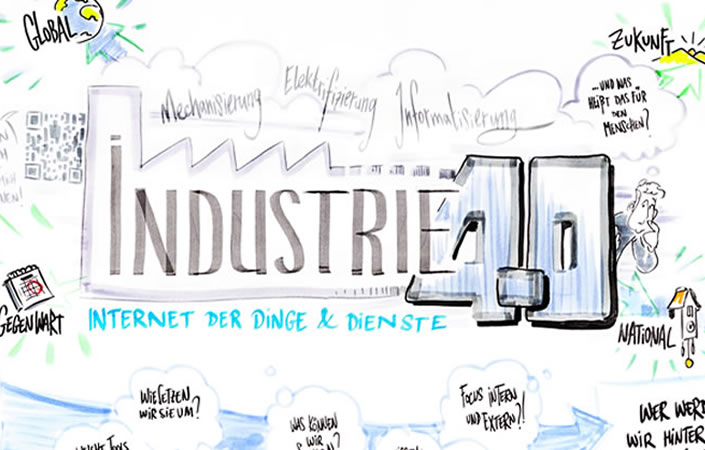
It is currently the main economic issue, and there is hardly any topic whereby the impact on industry and society is discussed so controversially. When it comes to the question of how digitalisation changes the working world, different opinions determine the public debate. Pessimists fear the destruction of jobs, while optimists see Industry 4.0 as an engine of growth and employment. In whichever direction it goes, one thing is certain: the pressure to change that is placed upon employees, employers and the state will increase significantly.
After the mechanisation, electrification and computerisation of the industry, the arrival of the Internet of Things and Services into the factory rings in a 4th industrial revolution. In the future, companies will network their machines, storage systems and operating equipment as Cyber-Physical Systems (CPS) worldwide. As a result, industrial processes in production, engineering and the supply chain can be improved fundamentally. In newly emerging Smart Factories, a completely new production logic is prevailing. The embedded production systems are networked with business processes within factories and companies and connected to value-added networks – from the order to the output logistics. At the same time, they enable and require a full view across the entire value chain.
Industry 4.0 creates new forms of value creation and novel business models. The opportunity to develop and offer downstream services is made available, especially for start-ups and small companies.
For companies, the Industry 4.0 work group sees, among other things, the need for action in the following fields:
- Mastering complex systems: Products and production systems are becoming increasingly complex. Adequate planning and explanatory models are a basis for mastering the increasing complexity. Engineers have to be given methods and tools to create such models.
- Safety: Operational and supply chain safety are critical factors in intelligent production systems. On the one hand, production plants and products should not pose a threat to people and the environment; On the other, the equipment and products themselves have to be protected against misuse and unauthorised access – particularly the data and information that are contained within them. For this purpose, among other things, integrated security architectures and clear identity verification have to be implemented and professional and further training contents have to be supplemented.
- Work organisation and design: The role of employees is changing dramatically in Smart Factories. The increasing real-time-oriented control changes the content, processes and environments of the work which is to be performed. This provides opportunities for greater self-responsibility and self-development among employees, which can be achieved through a socio-technical design approach. To this end, a participatory work design as well as life-accompanying qualification measures should be taken into consideration, and reference projects with an exemplary character should be initiated.
- Training and further education: Employees’ tasks and competency profiles will change significantly in Industry 4.0. This requires adequate qualification strategies and a learning-oriented work organisation that enables lifelong learning and workplace-oriented further training. For this purpose, model projects and »networks of good practice« should be promoted, for example, and digital learning techniques should be explored.
This means that companies have to change more quickly than before, to respond more quickly to impulses, and to deal competently with the increased complexity. The executives and the HR departments in companies are required to adapt the development of their staff more quickly and more strongly than before to new and changed requirements, as well as to establish work organisations that offer considerably more freedom than was the case before. Set shifts and firm department boundaries will also be put to the test, as will rigid job descriptions. Decisions will increasingly have to be made where the decisive situation arises. To accomplish this, a trust culture and the development of decision-making capacities are an absolute prerequisite. Industry 4.0 leads to more self-determined, self-responsible and, therefore, more highly motivated employees. To achieve this, new and innovative ideas and opportunities for further education, for school and university training, as well as for the dual training system and organisational development are necessary.
Wilhelm Dick
